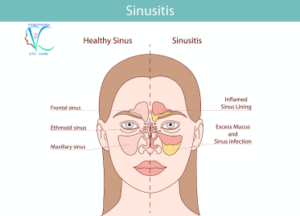Have you ever been startled by the sudden onset of a nose bleed? While nosebleeds can be alarming, most of the time, they’re harmless. Understanding the causes and treatment options can help alleviate your worries. This blog dives into the medical condition known as epistaxis (the medical term for nosebleeds), explains why it happens, and when you should seek professional care. If you experience frequent nosebleeds, Vivekananda ENT Clinic and Dr. Pinaki Mazumder are here to offer expert solutions and personalized care.

What is a Nose bleed (Epistaxis)?
Nose bleeds, or epistaxis, occur when blood flows from the tissue lining the inside of your nose. It may affect one nostril or both, though it commonly originates in one. While they can be unsettling, most nosebleeds are not a cause for concern and can often be treated at home.
The nose has an intricate network of tiny blood vessels near the surface of the nasal lining. These vessels warm and moisten the air we breathe but are also highly delicate and prone to bleeding when irritated or injured.
Types of Nose Bleeds:
- Anterior Nosebleed
- Starts at the front of the nose, usually caused by minor injuries or dry air.
- Common in children and not serious.
- Posterior Nosebleed
- Occurs deeper inside the nose, affecting larger blood vessels near the throat.
- Results in heavy bleeding and often requires immediate medical attention.
- More common in adults.
Common Causes of Nose bleed
Several factors can trigger a nosebleed. The most common causes include:
1. Dry Air
- Hot, low-humidity climates or heated indoor air dry out the nasal membrane, causing it to crack and bleed.
2. Nasal Trauma
- Nose picking, forceful nose-blowing, or facial injuries can damage the delicate nasal lining.
3. Infections and Allergies
- Colds, sinusitis, or allergic reactions can inflame and irritate the nasal passages, increasing the likelihood of bleeding.
4. Medications
- Blood-thinning drugs such as aspirin, warfarin, or frequent use of nasal sprays can make blood vessels more prone to breaking.
5. Underlying Medical Conditions
- High blood pressure, bleeding disorders like hemophilia, or nasal growths such as polyps and tumors can cause frequent or severe nosebleeds.
6. Other Unknown Causes
Less Common Causes:
- Exposure to chemical irritants.
- Snorting recreational drugs like cocaine.
- High altitudes with thinner, drier air.
- Hormonal changes during pregnancy that expand blood vessels in the nose.
Symptoms to Watch For
While most nosebleeds are isolated incidents, certain symptoms may point to underlying medical concerns. Consult a healthcare provider if you experience:
- Frequent or recurring nosebleeds.
- Blood draining down the back of your throat, causing nausea or a bad taste.
- Nosebleeds accompanied by unusual bruising, fatigue, or other systemic symptoms.
- Nosebleeds that last longer than 20 minutes despite applying pressure.
How to Stop a Nose bleed at Home
Follow these steps to manage a nosebleed effectively:
- Sit Upright: Lean forward slightly to prevent blood from draining into your throat, which can cause nausea.
- Pinch Your Nose: Use your thumb and index finger to press the soft part of your nose against the hard bony ridge. Hold for at least 5-10 minutes.
- Apply a Cold Compress: Placing an ice pack on the bridge of your nose can constrict blood vessels and slow bleeding.
- Avoid Blowing Your Nose: After the bleeding stops, avoid blowing your nose or bending over for at least a day to prevent re-bleeding.
If the bleeding continues after 20 minutes or you experience significant blood loss, seek medical attention promptly.
Preventing Nose bleeds
Here are some tips to minimize the chances of a nosebleed:
- Keep Your Nasal Passages Moist
- Use a saline nasal spray or apply water-soluble nasal gels like Vaseline to prevent dryness.
- Humidify the Air
- Use a humidifier at home, especially during winter, to add moisture to the air.
- Avoid Nasal Irritants
- Limit the use of nasal sprays and avoid exposure to chemical fumes or allergens.
- Be Gentle With Your Nose
- Avoid picking your nose or blowing it forcefully.
- Address Underlying Health Issues
- If you have conditions like allergies or high blood pressure, consult your healthcare provider for appropriate treatment.
- Protect Your Nose
- Wear protective gear during sports or activities that could lead to facial injuries.
When to Visit an ENT Specialist
While occasional nosebleeds are normal, certain situations require medical evaluation. You should consult an ENT specialist like Dr. Pinaki Mazumder if:
- You experience frequent or unexplained nose bleeds.
- You have symptoms like fatigue, unusual bruising, or persistent nasal congestion.
- You notice structural issues in your nose, such as a deviated septum or nasal polyps.
At Vivekananda ENT Clinic, Dr. Mazumder uses advanced diagnostic tools to identify the root cause of your nose bleeds. Treatment options may include:
- Nasal Cauterization: Sealing the bleeding blood vessel with heat or chemicals.
- Nasal Packing: Using gauze or sponges to create pressure and stop the bleeding.
- Medication Adjustments: Modifying or prescribing medications to address underlying conditions.
- Surgical Interventions: For structural problems like a deviated septum or nasal tumors.
Why Choose Vivekananda ENT Clinic?
With years of expertise, Dr. Pinaki Mazumder is a trusted name in ENT care. His personalized approach ensures accurate diagnosis and effective treatments for all ENT conditions, including recurrent nosebleeds. At Vivekananda ENT Clinic, patients benefit from state-of-the-art technology and compassionate care, ensuring better outcomes and peace of mind.
Conclusion
While nose bleeds are often minor and easily manageable, recurring or severe cases shouldn’t be ignored. Understanding the causes and prevention tips can help you manage nosebleeds effectively. For expert advice and treatment, trust Dr. Pinaki Mazumder at Vivekananda ENT Clinic. Schedule your appointment today to address your concerns and breathe easy again.





No comment yet, add your voice below!